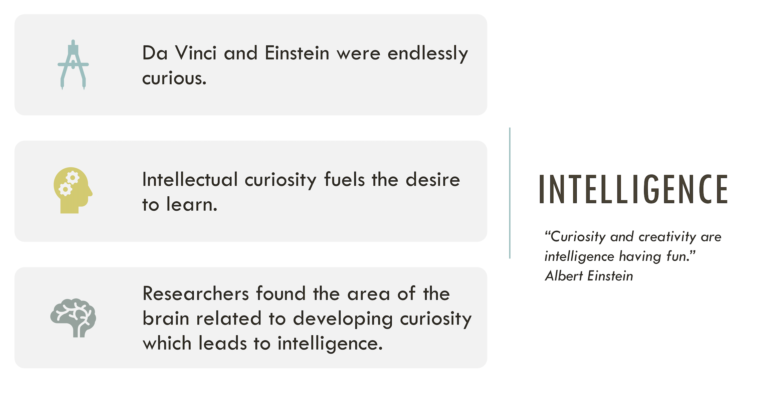Is Intelligence Correlated with Curiosity?
Are curious people naturally intelligent? Are smart people naturally curious? What, if any, is the correlation between intelligence and curiosity?
The words “intelligent,” “intelligence,” and “IQ” are as common to us as the words “smart,” “genius,” or “brilliant.” Since childhood, it’s been instilled in us that we’re either smart or not smart.
Intelligence and IQ
Picture your brain forming new connections as you meet the challenge and learn. Keep on going. Carol Dweck [1]
From intelligence to IQ
Fluid versus crystallised intelligence
Types of intelligence
Building blocks of intelligence
Conclusion
Discussion
We know we are all born with high levels of curiosity. The research shows around age five it starts to dwindle.How has your level of curiosity been impacted since you were young?How have you been able to keep it alive?
References
1. Dweck C. Mindset: The New Psychology of Success. New York: Penguin Random House; 2006.
2. Human Intelligence: Raymond B. Cattell [Internet]. Intelltheory.com. [cited 7 September 2020]. Available from: https://www.intelltheory.com/rcattell.shtml
3. Horn, J. L., & Cattell, R. B. (1967). Age differences in fluid and crystallized intelligence. Acta Psychologica, 26, 107-129
4. Gardner H. Frames of mind: The Theory of Multiple Intelligences. New York, NY: Basic Books; 1983.
5. von Stumm S, Hell B, Chamorro-Premuzic T. [Internet]. Hungrymindlab.com. 2011 [cited 7 September 2020]. Available from: https://www.hungrymindlab.com/wp-content/uploads/2015/10/von-Stumm-et-al-2011.pdf
Share this
Innovative Leadership: Developing Curiosity

Innovative Leadership: Developing Curiosity


Reach your personal and professional goals
Unlock access to hundreds of expert online courses and degrees from top universities and educators to gain accredited qualifications and professional CV-building certificates.
Join over 18 million learners to launch, switch or build upon your career, all at your own pace, across a wide range of topic areas.
Register to receive updates
-
Create an account to receive our newsletter, course recommendations and promotions.
Register for free








